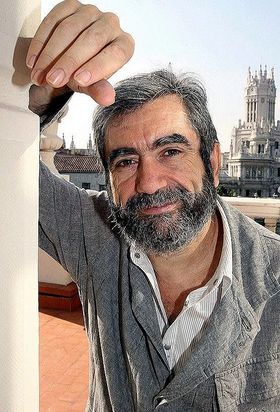VALENCIA. The writer Antonio Muñoz Molina (Úbeda, Jaen, 1956) has been recently awarded with the Prince of Asturias Award for Literature. Being a man of strong beliefs, he does not avoid controversy in his statements. He has just published the essay Todo lo que era sólido (Everything that was took for granted) (Seix Barral), a vindication for the rights earned after years of democratic struggle. An erudite, article writer and champion of the scientific culture, in this interview, Muñoz Molina reflects on the relationship between science and journalism.
–Why do you think there is so little scientific information in general-interest media?
–First of all, the people that work in that kind of media have usually studied journalism, which is a very superficial degree and, in addition, it is «Humanities degree». Secondly, the media is undergoing an irreversible process of trivialisation in Spain that makes issues like science and literature look "unsellable". That is a huge contrast with newspapers like The New York Times, for instance, which every Tuesday publishes an extraordinary scientific supplement. There are some respectable exceptions, of course. In El País, Alicia Rivera and Javier Sampedro write very well about science.
–Do you think that the journalist-scientist relationship, with some exceptions, is irreconcilable? What are the main differences between both them in your view?
–There is no reason why it should be. Both of them share curiosity as the basis of their jobs. There is a fundamental difference, of course, because scientists do not prioritise raising the public's interest.
–Why are you interested in science? Being a journalist, what raised your interest about it?
–Well, I am not a journalist. I left the degree very early on, and I have never worked in any editorial office. When I was younger those things would not catch my attention. I was interested in fiction literature, arts, and almost nothing else. My generation, since we had a provincial complex, wanted to be very cosmopolitan and used to look down on nature. In addition, science was very badly taught in schools back then. Physics, chemistry and math lessons were a total nightmare in the Catholic school I went to. I grew interested little by little; I think it was after I came across the excellent popular science written in English.
–In «Cuestión de método» (A Matter of Method), published in January 2012 in Muy Interesante, you claimed that a scientific culture is essential to avoid some public life disasters and to create a democratic citizenship. Do you somehow link science with common sense? Do you think that we would have a more sensible society if scientific education was better?
–Absolutely. Even taking into account the human tendency to delusion, fanaticism and indestructible certainties. Democracy is close to scientific method: you try one leader out, and if it does not work, another one is chosen. Transparency enables the correction of mistakes, and the greater your reasoning skills are and the more real world information the citizen has, the more difficult should be that the politicians' clumsy messages catch.
–Do you think that the scientific method can be applied in every aspect of life?
–Somehow, I do. We should learn to see the world just as it is; distinguish between desire and reality; and focus on the signs that enable us to understand people better.
Full text available at Mètode's website.
_____________________________________________
Mar Sanjuán Santonja. Bachelor of Journalism
Foto: Jesús de Miguel
Noticias relacionadas
 AVISO DE COOKIES: Este sitio web hace uso de cookies con la finalidad de recopilar datos estadísticos anónimos de uso de la web, así como la mejora del funcionamiento y personalización de la experiencia de navegación del usuario. Aceptar
Más información
AVISO DE COOKIES: Este sitio web hace uso de cookies con la finalidad de recopilar datos estadísticos anónimos de uso de la web, así como la mejora del funcionamiento y personalización de la experiencia de navegación del usuario. Aceptar
Más información


 imprimir
imprimir meneame
meneame
 whatsapp
whatsapp
